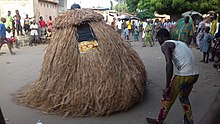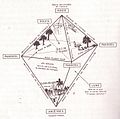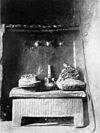Introduction The beliefs and practices of African people are highly diverse, and include various ethnic religions. Generally, these traditions are oral rather than scriptural and are passed down from one generation to another through narratives, songs, and festivals. They include beliefs in spirits and higher and lower gods, sometimes including a supreme being, as well as the veneration of the dead, use of magic, and traditional African medicine. Most religions can be described as animistic with various polytheistic and pantheistic aspects. The role of humanity is generally seen as one of harmonizing nature with the supernatural. They generally seek to explain the reality of personal experience by spiritual forces which underpin orderly group life, contrasted by those that threaten it. Unlike Abrahamic religions, traditional African religions are not idealisations; they seek to come to terms with reality as it is. (Full article...) Selected articleTraditional African religions have shared notable relationship with other religions, cultures, traditions. Throughout the history, they are often noted for having one of the oldest presence in the world, and also applauded for its tolerance with other religions. Selected imagesFestivalsThere are several religious festivals found in the various Traditional African religions. Some of these are listed below next to their corresponding religion :
Selected biography
Sundiata Keita was a puissant prince and founder of the Mali Empire. The famous Malian ruler Mansa Musa, who made a pilgrimage to Mecca, was his great-nephew.
Written sources augment the Mande oral histories, with the Moroccan traveller Muhammad ibn Battúta (1304–1368) and the Tunisian historian Abu Zayd 'Abd al-Rahman ibn Muhammad ibn Khaldun al-Hadrami (1332–1406) both having travelled to Mali in the century after Sundiata’s death, and providing independent verification of his existence. The semi-historical but legendary Epic of Sundiata by the Malinké/Maninka people centers on his life. The epic poem is primarily known through oral tradition, transmitted by generations of Maninka griots. Selected quote
Source: Diouf, Babacar Sédikh, Le Sérère, Paganism Polythéiste ou Religion Monothéiste [in] Camara, Fatou Kiné (PhD) & Seck, Abdourahmane (PhD), "Secularity and Freedom of Religion in Senegal: Between a Constitutional Rock and a Hard Reality", p 860-61 (PDF - p. 2-3) [1]
Did you know
Related portalsTopicsFor more Traditional African religion topics, see Category:Traditional African religions.
CategoriesWikiProjectsThings you can doAssociated WikimediaThe following Wikimedia Foundation sister projects provide more on this subject:
Discover Wikipedia using portals |





































